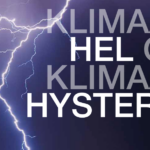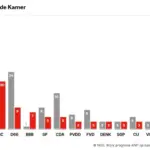Trouwe lezers zullen zich misschien nog herinneren dat ik vele jaren geleden – als eerste in Nederland – heb gewezen op wetenschappelijke literatuur die afkoeling in plaats van opwarming verwachtte – zulks onder meer op basis van publicaties van de Russische astronoom Habibullo Abdussamatov.
Zie bijvoorbeeld het TV-interview hier.
Naar aanleiding daarvan heeft Bart Strengers van het Planbureau voor de Leefomgeving (PBL) mij uitgedaagd om daarover een weddenschap af te sluiten. Hij zette in op verdere opwarming en ik op afkoeling. Bart Strengers won die weddenschap (om een fles wijn).
Zie voor onze – mijns inziens nog steeds actuele – discussie, gepubliceerd door het het PBL(!), hier.
Er is een gevleugeld – maar half-serieus – gezegde onder economen:
If you project a number in the future, you should never give a date. If you give a date, you should never give a number.
Ik heb gezondigd tegen deze stelregel en moest vervolgens op de blaren zitten. Het zij zo!
Toch duikt het afkoelingsscenario steeds maar weer opnieuw op – niet alleen in de media, maar ook in de peer-reviewed literatuur. En ik heb de indruk dat dit de laatste tijd met grotere regelmaat gebeurt dan voorheen.
Het laatste voorbeeld daarvan is een artikel van Stephen Chen in de South China Morning Post onder de titel: ‘Scientists warn of global cooling trick up nature’s sleeve’. Stephen Chen signaleert hierin een studie van Wu Jing, van het Key Laboratory of Cenozoic Geology and Environment, verbonden aan het Institute of Geology and Geophysics, dat deel uitmaakt van de Chinese Academy of Sciences. Het artikel is geaccepteerd voor publicatie in het online Journal of Geophysical Research: Atmospheres.
Ik pik er een paar elementen uit.
Research sheds light on 500-year Chinese weather cycle and suggests a cool change could be on the way.
A new study has found winters in northern China have been warming since 4,000 BC – regardless of human activity – but the mainland scientists behind the research warn there is no room for complacency or inaction on climate change, with the prospect of a sudden global cooling also posing a danger.
The study found that winds from Arctic Siberia have been growing weaker, the conifer tree line has been retreating north, and there has been a steady rise in biodiversity in a general warming trend that continues today. It appears to have little to do with the increase in greenhouse gases which began with the industrial revolution, according to the researchers.
Lead scientist Dr Wu Jing, from the Key Laboratory of Cenozoic Geology and Environment at the Institute of Geology and Geophysics, part of the Chinese Academy of Sciences, said the study had found no evidence of human influence on northern China’s warming winters.
Wu and her colleagues are concerned that, as societies grow more used to the concept of global warming, people will develop a misplaced confidence in our ability to control climate change. Nature, they warned, may trick us and might catch us totally unprepared – causing chaos, panic, famine and even wars as the global climate system is disrupted. …
Wu and her colleagues spent more than a dozen years studying sediments under Moon Lake, a small volcanic lake hidden in the deep forests of the Greater Khingan Mountain Range in China’s Inner Mongolia autonomous region. They found that winter warming over the past 6,000 years had not been a smooth ride, with ups and downs occurring about every 500 years.
Their findings confirmed an earlier study by a separate team of Chinese scientists, published by online journal Scientific Reports in 2014, which first detected the 500-year cyclical pattern of China’s summer monsoons and linked it to solar activity.
The 2014 research, which drew on 5,000 years’ worth of data, suggested the current warm phase of the cycle could terminate over the next several decades, ushering in a 250-year cool phase, potentially leading to a partial slowdown in man-made global warming. …
According to Wu, the variation in solar activity alone was usually not strong enough to induce the rapid changes in vegetation the research team recorded in the sediment cores of Moon Lake. Instead, the scientists found the warming impact was amplified by a massive, random interaction between surface seawater and the atmosphere in the Pacific Ocean known as the El Nino-Southern Oscillation.
As a result of the research findings, Wu said she was now more worried about cooling than warming. A sharp drop of temperature will benefit nobody. The biggest problem is, we know it will come, but we don’t know exactly when.
Lees verder hier.
Opwarmers en afkoelers hebben tegenovergestelde opvattingen over wat het klimaat gaat doen, maar over één ding lijken zij het – ongelukkigerwijs – eens: er is alle reden voor alarmisme.






ER is geen oorzaak om alarmbellen te luiden, maar er is wel een sterke neiging in de mens om aan alarmisme te doen. Het zit in onze natuur. We zijn als nogal kwetsbare diersoort steeds op onze hoede voor gevaar. Dat is er in de periode dat we als nomaden leefden in gekomen en dat soort dingen, Jung noemde het archetypen, en dat werkt nog steeds, sterker nog, zal de komende duizenden jaren nog zo blijven werken. De Klimaathype is in dat licht een normaal verschijnsel, er zijn er vele aan vooraf gegaan. Het is de taak van de rede om die neigingen te onderzoeken en hun waarde te bepalen. Politici zouden, als leiders, aan de rede voorrang moeten geven om de de mensheid te behoeden voor dwaalwegen, maar doen meestal het tegenovergestelde, hetzij opzettelijk om er zelf voordeel aan te hebben, hetzij dat ze net zo ongeschikt zijn als bijna iedereen om hun taak als leider verantwoord uit te voeren.
Mijn excuses voor het belichten van wat negatieve aspecten van de mens.
Wat gezien is kan niet ongezien gemaakt worden.
Leiders hebben narren nodig, onaantastbaren die leiders een spiegel durven voorhouden.
Helaas, het narcisme overwint.
Leiders die de eigen werkelijkheid (lees: rotkop) niet willen zien verbannen de narren, huren cosmetikanten, costumiers, coiffeurs, mooipraatadviseurs en statistische fraudeurs in.
In naam van de rede: Narren aller landen verenigt u!
Wie is hier de nar? Donald of Greta?
https://www.telegraaf.nl/nieuws/1108826834/klimaatmeisje-greta-ontmoeting-met-trump-verspilling-van-tijd
Ze trekt wel een grote broek aan, want vraagt zij zich overigens wel af of Donald hier überhaupt wil ontvangen????
Duidelijk
Donald is de leider die zich niet wil laten informeren
Een pure narcist die in zijn eigen leugens geloofd
Trump laat zich juist informeren door onafhankelijke betrouwbare wetenschappers
Ach, jeetje, von den Haiden ziet de naam “Trump” en de stoom komt meteen uit z’n oren.
https://www.youtube.com/watch?v=wDYNVH0U3cs
Het moreel superieure links is toch zo’n slechte verliezer. (⌐■_■)
Ik denk dat Trump ook helemaal niet zit te wachten op een bezoek van Pippi Dramkous….
Michiel
En hebben die wetenschappers ook wetenschappelijke publicaties op het gebied van klimaatverandering op hun naam staan ?
Sommige leiders nemen dat erg letterlijk boels
https://nos.nl/artikel/2189727-franse-president-macron-gaf-26-000-euro-uit-aan-make-up.html
Het is al lang bekend dat de klimaathype in elkaar geknutseld is door de cia. En vanzelf maakt die club misbruik van de domheid van mensen.
Inderdaad Ben en jij bent een goed voorbeeld van iemand die zich makkelijk laat misleiden
En dat terwijl iedereen weet dat het Kremlin er achter zit!
@Neel, ben jij nog van de Paranoia Radioshow?
Et voilá, voeg daar de inbreng van Valentina Zharkova nog bij, nou, dan weet ik het wel.
Ik ga voor de afkoeling! Wetenschappers die bereid zijn mijn overtuiging van een wetenschappelijke onderbouwing te voorzien (In het Nederlands!) zal ik gaarne sponsoren. Emeritus hoogleraren verdienen mijn voorkeur.
Mijn buurman is een echte trendsetter, hij laat zijn huis isoleren in afwachting van de warmtepomp. Van de beloofde besparingen wil hij een wereldreis maken.
Zijn kruipruimte wordt gevuld met schelpen met daarbovenop steenwol, het schijnt de koninklijke weg te zijn.
Ik vul mijn kruipruimte met antraciet nootjes no3, lezer. Er kan voldoende in om ons jaren te verwarmen straks en over dertig jaar brengt geconcentreerde koolstof aan de oppervlakte een Godsvermogen op..
Let op: ik voorspel een zeer grote opwarming in China de komende 20 jaar en dat zal niet aan CO2 liggen maar de regionale verdwijning van de luchtvervuiling door steenkool.
Door het gebruik van schonere verbranding van de fossiele brandstoffen in de industrie en de overschakeling van steenkool op gas in de huishoudens ontstaan er de komende jaren minder aerosolen en ozon in China, gevolg is: minder smog en minder lage wolken, waardoor er dus meer zoninstraling en hogere temperaturen komen. En dat zal allemaal geweten worden aan CO2, net als in west-europa. Omdat in europa de lucht al schoon is zal hier de temperatuur niet gaan stijgen.
Ik was een aantal jaren geleden in Yuyen, de hele week geen wolken gezien maar ook geen zon. Vreselijk vieze lucht met name veroorzaakt door bouwactiviteiten.
“Door het gebruik van schonere verbranding van de fossiele brandstoffen in de industrie en de overschakeling van steenkool op gas in de huishoudens ontstaan er de komende jaren minder aerosolen en ozon in China, gevolg is: minder smog en minder lage wolken, waardoor er dus meer zoninstraling en hogere temperaturen komen. En dat zal allemaal geweten worden aan CO2, net als in west-europa. Omdat in europa de lucht al schoon is zal hier de temperatuur niet gaan stijgen.”
Je vertelt maar de helft van het verhaal, Hans Erren, en dat weet je waarschijnlijk zelf ook wel. Door de toenemende luchtvervuiling is een deel van de opwarming in de afgelopen tijd gemaskeerd. Bij het schoner worden van de lucht gaan we wat dat betreft weer terug naar een meer natuurlijke situatie. De CO2-concentratie blijft inmiddels wel oplopen. Ook op wereldschaal werd ‘Global Brightening’ vooraf gegaan door ‘Global dimming’. De laatste decennia zet de ‘brightening’ niet door. Regionaal wordt de lucht schoner, elders juist viezer.
De luchtkwaliteit in centraal-Azie wordt trouwens niet alleen bepaald door kolenstook en industrie, maar ook door grootschalige bosbranden zoals deze zomer in Siberië.
Nou Bart. Die grootschalige bosbranden vinden ieder jaar plaats. Vulkaan uitbarstingen ook. Dus een natuurlijke oorzaak. Maar wat is nu jouw punt?
Hoe warmer >> hoe droger >> des te meer bosbranden >> meer stofdeeltjes >> meer regen en gefilterde zon >> meer vergroening, dat is de schommelende balans tussen de natuur / klimaat.
De natuur houdt al miljoenen jaren een natuurlijk evenwicht op aarde, door de koolstof- en watercycli. Deze cycli brachten koolstof in en uit de atmosfeer en de oceanen evenals het land. Op dezelfde manier verplaatste het water cyclisch water rond het land totdat het verdampt als waterdamp in de atmosfeer om de aarde comfortabel warm te houden en dat gaat al zolang het leven op de planeet bestaat, en veel langer, het zijn de broeikas cycli van zo’n 21 bepalende klimaatfactoren naast CO2-uitstoot.
bosbranden in Siberië hebben geen effect in China https://www.vox.com/2019/8/1/20750200/siberia-wildfire-russia-fire-smoke-trump-putin
Chinese luchtkwaliteit wordt gedomineerd door:
Stoken van zwavelhoudende steenkool in woningen en industrie, tweetaktbrommerjes in de stad.
China heeft onlangs een gascontract met Putin gesloten en rookontzwaveling en vliegasvewijdering wordt geïmplementeerd in de industrie, in Chinese steden wirden elektrische brommers verplicht.
Luchtvervuiling zorgt voor smog.
Verwijdering van luchtvervuiling zorgt voor minder aerosolen, dus minder condensatiekernen dus minder lage wolken dus meer zon dus hogere temperatuur,
Zoals door de AFNAME van luchtvervuiling in Europa gebleken is. Want Europa is sneller opgewarmd dan de rest van de wereld
Beetje te simpel gedacht, Hans. Het arctische gebied is nog sneller opgewarmd dan Europa.
Re: “Beetje te simpel gedacht, Hans. Het arctische gebied is nog sneller opgewarmd dan Europa.”
Inderdaad, bij Spitsbergen tot wel 6 graden sinds de jaren ’60… met de kanttekening dat dit aan het begin van de 20ste ook al gebeurde maar toen in een nog sneller tempo.
PS. O ja… vergeet ik op de valreep bijna nog om het volgende te vermelden:
De opwarming bij Spitsbergen is momenteel niet veel meer dan een graadje t.o.v. de jaren ’50…. en bovendien behoort Spitsbergen tot de regios in de wereld met de hoogste natuurlijke variabiliteit… maar dat hoeft de rest van de wereld niet weten, toch? Bij de buren op Groenland waren de jaren ’30 en ’40 nog steeds de warmste decennia waren sinds 1900; enkel op noordwest Groenland lijkt mogelijk wel sprake van wat meer recent opwarming, maar dat is eigenlijk onzeker omdat er slechts metingen zijn vanaf 1949 voor die regio – dat beseffen de jongste generaties Groenlanders niet eens want die wonen daar immers niet, Dus de rest van de wereld mag over dat land denken wat ze willen tegenwoordig… maar het is wel een feit dat de ijsklomp tussen 2017 en 2018 voor het eerst netto groei heeft laten zien. Bovendien behoort het klimaat op Groenland (in tegenstelling tot Spitsbergen) tot een van de meest stabiele klimatologische regios in de wereld – wat waarschijnlijk met die klomp ijs van doen heeft… want voor de zuidpool geldt eigenlijk hetzelfde haaltje: ‘stable a rock’ … een ijs-rots wel te verstaan.
Het hele verhaal kan ook als volgt worden samengevat in 1 notendop… of liever gezegd… 2 plaatjes:
http://klimaatcyclus.nl/klimaat/pics/groenland-temperatuur-ijsland-spitsbergen.jpg
h ttp://klimaatcyclus.nl/klimaat/pics/temperatuur-ontwikkeling-zuidpool-noordpool-groenland.jpg
En voor de echte liefhebbers is er ook nog de volgende ‘wildcard’:
h ttp://klimaatcyclus.nl/klimaat/pics/hydrothermische-energie-spitsbergen.jpg
Dan ga je dus vanuit dat de x kolencentrales per week die nu in gebruik worden genomen t.z.t. al weer buiten werking worden gesteld.
Wat Trump en Greta betreft.
Is er al berekend wat de VS aan uitstoot heeft bespaard door overstap naar gas? En weet Greta dat?
Off topic maar wilde het toch delen; oordeel zelf.
https://youtu.be/AFPRMV2p5cY
Ik vind het on-topic ;-)
Een titel boven een anonieme link biedt meer duidelijkheid voor de lezer wat deze kan verwachten.
Dat is waar niet aan gedacht
Een hele leerzame video over het effect van heat islands in de bepaling van temperaturen
How Homogenization Destroys Climate Science
In this video, I show how NOAA and NASA create the appearance of warming – by contaminating rural temperature data with bad data from Urban Heat Islands.
Eigenlijk begin ik de fraude van homogenisatie baggerzat te worden.
Het wordt al jaren gerapporteerd.
Ik kan ondertussen een ellenlange ellendige lijst aanleggen.
Ik pik het niet meer; ik pik de excuses van zogenaamde statistici en verantwoordelijken voor homogenisatie ook niet meer.
Volgens de ideologische alarmisten (en zakkenvullende klimaatbandwagon) in Nederland van de gehypte CAGW kunnen we het beste zo snel als mogelijk alle fossiele energiegebruik / – productie maar afbouwen / stoppen. De eerste (verwachte) volgende strenge winter in Nederland zal blijken hoe ideologisch dom dat is (geweest), en dat “duurzame” klimaatbeheersing een zeer koude staatspopulistische farce is.
zakkenvullende klimaatbandwagon
Voor de scrabblelaars: bedondernemers.
De burgers moeten ze niet van het gas af halen dat is nonsens en brengt zo goed als niets.
Wat als er wel eens een goede winter komt, sneeuw ijs op zonnepanelen,
Ijsafzetting op molen wieken.
Geen enkele trein loopt hier meer in dit land.
En dan?
Electrische auto’s hebben in extreme kou de helft van hun actieradius.
Ik vind het een grote gok wat men doet in dit land.
Veel dingen zijn niet meer berekend op een strenge winter.
Net zo als een hittegolf is het ook mogelijk dat een strenge koude periode komt.
Wie heeft de pacht in huis om te beweren dat dit niet meer mogelijk zou zijn!
Als er werkelijk een kleine ijstijd komt houden we maar buiten beschouwing, want dan is het voor veel burgers afzien.
De overheid heeft een zorgplicht naar zijn burger en heeft zich verplicht zijn burgers niet in gevaar te brengen.
Met huidig beleid wordt hier niet aan voldaan!
Michiel,
Uit het oogpunt van de alarmisten moet er nu wat gebeuren want anders staan onze vreselijke rampen te wachten (zie de Urgenda rechtzaak).
Aangezien de meerderheid van de politiek daarin geloofd en uit het oogpunt van zorgplicht, worden we nu dus opgezadeld met een prachtig
klimaatplan om de wereld te redden.
Het kwartje kan twee kanten opvallen, ofwel over 150 wordt de nieuwe brug over de IJssel vernoemd naar Rob Jetten of Jesse Klaver met een mooie plaquette, “door
hun klimaatplannen werd de wereld gered van een catastrofe” of ze komen in het rijtje van de wereld geschiedenis te staan tussen Mao en Stalin, als het drama van de Hollandse grote sprong voorwaarts. Ik zet mijn centen op het laatste.
De overheid heeft inderdaad een zorgplicht, lees de grondwet er maar op na. Overigens, als je dan toch dat gedrocht voor je neus hebt, kijk dan eens goed, dan ontdek je dat onze rechten helemaal niet zo zeker zijn en de plichten des te meer. het is een geschrift van machthebbers en heeft in hoe die machthebbers zich verhouden tot de gewone mens, weinig te maken met vrijheid en gelijkheid. ’t Is triest, het is van alle tijden.
Niek; de zorgplicht kan ook vervuld worden door ons aan te passen aan het vermeende probleem. Wanneer bijv. de zgn. oplossing hun uitwerking missen en de zee toch gaat stijgen zijn we financieel niet meer in staat de dijken te verhogen.
resumerend is het plan heel ondoordacht (populistisch zelfs) en daardoor eenzijdig en wordt hiermee niet aan de zorgplicht voldaan.
Natuurlijk Theo gaan we allemaal van het gas af. Ik durf te wedden dat de huishoudens het niet warm krijgen wanneer er een strenge winter komt.
Dan gaan we met z’n allen aan de houtkachels, hout stoken. Zo want de aardwarmte is niet voldoende.
Nou Durk, als het aan mij lag ging ik een paar kilometer oostelijker wonen, en ik denk dat dit ook nog gaat gebeuren.
Je moet eens kijken wat een huis daar maar kost tegenover hier.
Ik heb weinig zin in al die onzin maatregelen van hier.
Daar heb ik ook over nagedacht Theo. Als Nederlander krijgen we ook nog subsidie. Huizen zijn beter en goedkoper.
@Durk, als je werkt in Nederland dan heb je zo wie zo voordelen vraag me niet hoe, en waarom.
Mijn schoonbroer woont er al jaren, die heeft me vaak het een en ander verteld, maar dat interesseerde me toen niet.
Wel weet ik dat je een goed aanpassingsvermogen moet hebben als je op het dorp gaat wonen.
In sommige plaatsen verwachten ze ook dat je naar kerk gaat.
Niet te geloven in deze tijd.
Maar ja kijk ook eens hoe vaak ze vrij hebben door dat ze dat allemaal in stand houden.
Hier in Nederland is dat bijna allemaal afgeschaft.
Theo. Daar houdt ik wel van. Normen en waarden. Degelijkheid en vooral de maak industrie. En daar hoort de kerk ook bij. Maar ja daar moet je in Nederland eens mee aankomen. Christendom en geloof. Ik werd hier al een paar de brandstapel op gestuurd….haha…stelletje ongelovigen (grapje jongens en meisjes).
In Nederland schaffen ze alles af. Prima hoor als ze maar van de AOW en mijn pensioen afblijven. Trouwens Frankrijk is ook best fijn. Wijntje, rustig aan doen. Ja,…die Chris heeft het goed voor elkaar!
@Durk de brandstapel?, ik vind dat moet iedereen zelf weten of iemand ergens in gelooft, wij zijn gewoon katholiek opgevoed.
Men zei vroeger, nood leert bidden, dat heb ik inderdaad al een paar keer gezien.
Mijn moeder zei altijd, als niemand nergens meer in gelooft komt rotzooi in de wereld.
Eigenlijk moet ik haar daar wel gelijk in geven.
En als dat zo verder gaat dan komen mijn kleinkinderen nog met het hoofd naar oosten te liggen.
Ja ja we leven in spannende tijden.
Als we het mogen beleven wordt het lachen.
Henk Ter info
Kijk ook eens naar de rol van de klimaatwetenschap.
New sun-driven cooling period of Earth ‘not far off’
https://www.youtube.com/watch?v=ViY2J3LPgN4
Hugo
Welke wetenschappelijke publicatie kan ik van deze heren lezen ?
Hoewel niet altijd betrouwbaar, maar toch …. https://en.wikipedia.org/wiki/Nils-Axel_M%C3%B6rner
Of anders hier: https://www.researchgate.net/profile/Nils-Axel_Moerner
At your service!
Happy hunting, Jan.
https://www.researchgate.net/profile/Nils-Axel_Moerner
Beste heer of mevrouw J. van der Heijden.
Wij hebben enige discussie gehad op dit mooie forum.
Ik ben Civiel Technisch ingenieur. Wat is uw achtergrond?
Vriendelijke groet, Wijnand
Zoals de Duitsers zeggen: „Den Fels der Narren findet man leichter als den Stein der Weisen.“
Niet wetenschappelijk onderzocht, maar daarom niet minder waar.
Wauw Wijnand. Civiel Technisch Ingenieur….ik krijgt het bijna niet uit mijn toetsenbord…
@Henk dJ.
“Wijnand, wat doet het er toe wat iemands opleiding is? Wil je het autoriteitsdrogargument gaan hanteren?”
Dus wanneer het jou beter uit komt, dan telt in sommige gevallen het autoriteitsargument even niet mee!
Met andere woorden; iemand die niets heeft gepubliceerd, maar wèl zinnige dingen zegt telt gewoon mee!
Als jou antwoord ‘ja’ is, dan zijn we het (een keer) eens!
Hugo,
Niels Axl Morner is geen specialist is op het gebied van zonneactiviteit of klimaatverandering, maar een specialist is / was op het gebied van de zeespiegel
Dus helaas, een intervieuw van iemand die geen verstand heeft van zake, geen autoriteit dus op dat gebied.
Bel hem even en vraag welke publicaties hij zich op baseerd
J vdH
Even wat recht zetten.
Oorzaak en gevolg.
We worden zo ongeveer dagelijks geconfronteerd met opwarmingsrampen.
Een daarvan is een versnellende zeespiegelstijging Amersfoort aan zee.
Zie Deltares 18 september 2018. https://www.deltares.nl/nl/nieuws/deltares-brengt-mogelijke-gevolgen-van-versnelde-zeespiegelstijging-voor-nederland-kaart/
5 maart 2019
De conclusie is dat de zeespiegel de afgelopen 128 jaar met 1,86 mm per jaar (18,6 cm per eeuw) is gestegen en dat de stijging niet is versneld.
https://www.deltares.nl/nl/nieuws/nauwkeuriger-inzicht-huidige-zeespiegel-langs-de-nederlandse-kust/
Draaien we de zaak even om. Er is geen versnelde zeespiegelstijging gemeten
En dat betekent dat er geen sprake kan zijn van een versnelde opwarming.
Hoe zou het komen dat Deltares het alarmerende pad verlaten heeft?
Geen versnelde zeespiegelstijging dan ook geen versnelde opwarming.
Geef me even je telefoonnummer je universiteit en studierichting.
Kunnen we de alumni lijst eens bekijken.
Hugo,
Ik zal je iets verklappen (maar niet verder vertellen hoor! )
Nederland is niet de wereld!
Oh en ik vraag me af of je je lagere school hebt afgemaakt, want vaan aardrijkskunde heb je nog niet veel begrepen
@Hugo:
Wat ik mij herinner van zijn eigen woorden:
beroep: operator
opleiding: in Delft, beslist niet aan de TU; studeren doe je ook in het MBO en HBO.
Niks mis mee.
Grote broeken zijn overal te koop.
Boels,
Ik ben zeker geen operator
Maar het verschil tussen de Noordzee en het totale zeeoppervlak had ik al op de basisschool geleerd.
Ik begrijp dta het voor de mensen van voor de Mammoetwet wat lastig is
Boels,
Hugo en jij trekken inderdaad grote broeken aan
Dat de aarde opwarmt in zijn geheel sluit niet uit dat in lokale gebieden extremere kou of warmte kan ontstaan onafhankelijk, of juist als gevolg daarvan.
Dit bericht laat veel over voor interpretatie, maar ik vind wel dat de waarschuwing voor kou- extremen in dit gebied wel uit het niets komt. Al is het wel goed om gebaseerd op dit bericht maatregelen te treffen als men in dit gebied woont.
Kangoeroes in de sneeuw: https://www.youtube.com/watch?v=c4lCKstKrXA
Toestand weer.
Groeten, Ben
Kijk eens hier wat er gebeurd met co2 nutrale huizen, dan word je juist ziek door de co2.
Dat ze maar opsodemieteren met hun idiote doelstellingen, je zult er maar wonen.
https://www.limburger.nl/cnt/dmf20190812_00118222/knallende-koppijn-in-een-duurzaam-co-sub-2-sub-neutraal-huis
Toch wel grappig dat de alarmisten achter een theorie aanlopen die alleen 150 jaar geleden is aangetoond onder een glazen bakje zonder convectie. :)
BBC-News had vanmorgen weer een item over de klimaatalarmistische Greta Thuberg. Onze spijbelende VN-IPCC-CAGW-Asperger-troetel wil niet meer vliegen !
Dat beperkt haar alarmistische VN-actieradius, echter ze gaat nu per race-zeilschip naar de volgende klimaat conference in de USA vanwege zero-CO2-uitstoot.
“Greta Thunberg: Teenage climate change activist is setting sail on zero-carbon journey aboard Malizia II.”
Gezien het huidige chaotische Atlantische weer wordt dat wel een ruw en bonkig zeilreisje op de zee spartaans uitgeruste Malizia II:
https://www.bbc.co.uk/newsround/49341692?intlink_from_url=https://www.bbc.com/news/topics/cwmrxq94v1jt/greta-thunberg&link_location=live-reporting-story
Geen probleem, er zit op elk zeewaardig zeiljacht van die klasse een flinke dieselmotor als back-up.
Oh ja, en natuurlijk nog een portie begeleidingsschepen want het moet een mooie film worden.
De “accomodatie” op de Malizia II:
https://ichef.bbci.co.uk/news/624/cpsprodpb/12D04/production/_108106077_tv055577988.jpg
Ben ik benieuwd hoeveel windmolen hoe lang hebben moeten draaien om de energie bij elkaar te harken die het bouwen van dit koolstofvezelbootje heeft gekost.
Kunnen koolstofvezel eigenlijk gerecycled worden…?
“Kunnen koolstofvezel eigenlijk gerecycled worden…?”
Ik denk dat ze wel mooi op te stoken zijn, maar ja, CO2 hè! Dan weet je het wel.
Heerlijk dat zeilen, met de wind door je haar.
Het lijkt wel een tank.
@ Scheffer
En dat midden in het Atlantische storm seizoen. Dat wordt straks een probleem want ze weigert te vliegen en na een paar weken in een race zeilschip zet ze nooit meer haar voet op een schip. Hoe moet ze dan weer thuis komen?
Ja dit is puur propaganda hoor, wat denk je dat deze boot kost?
Al de bemanning wat mee moet, en dan hebben we het maar niet over de co2 uitstoot dat de lucht in is gegaan met de nodige chemische stoffen voor dat jacht te bouwen.
Dit is propaganda puur, dit gaat de hele wereld over.
Ik vind het erg dat dit kind een psychiatrische ziekte heeft, maar hoop toch dat ze van begin tot einde moet kotsen, maar dat zullen we wel nooit te horen krijgen.
Trouwens dit is de eerste keer dat ik een ziek mens wat slechts gun.
Maar ik denk toch dat deze actie niet van haar zelf komt.
https://www.lonelyplanet.com/news/2019/07/31/greta-thunberg-nyc-eco-friendly-yacht/
@ Theo
Een prins van Monaco leent haar het schip. Het is een schande dat leden van het koningshuis pal achter de quasi-communistische UN plannen staan, inclusief afschaffing van landen en zelfbestuur.
Zo trolt Farage Price Henry regelmatig over zijn klimaat obsessie.
https://twitter.com/ClimateRealists/status/1161223847917641728
Het is een schande maar niet onverwacht. Want vele leden van de koningshuizen zitten in ronde tafel commissies welke de facto de agenda van de UN bepalen. Zo is koningin Beatrix lid en (in ieder geval voormalig) voorzitster van de “Committee of 300”. En Willem Alexander is een fervent bezoeker van de Bilderberg meetings, een uitvoerend orgaan voor wat er in de Committee of 300 besloten wordt.
Hoeveel mensen reizen nog achter haar aan met het vliegtuig? Wat een symbool politiek
@MP, dat is zeker zo, maar voor hun is het ook weer een gratis reclame stunt, kijk hoe goed wij zijn.
Hoeveel mensen die stinkend rijk zijn en in Monaco wonen, die eerlijk zo rijk zijn geworden?
Wereldwijde grote orkaan trend, volgens Dr. Ryan et al (2018)
https://twitter.com/NoTricksZone/status/1161750992846753794
Waarom draaien Marxisten de realiteit 180 graden om? Meer grote stormen krijg je als het klimaat afkoelt….
Dat wordt visjes voeren voor Pippi Dramkous!
@Johan,
Glasvezel en koolstofvezel is met epoxy hars ingestreken in de mallen en worden dan vacuüm getrokken, hoe dunner het laagje epoxy wat over blijft hoe sterker en lichter het word.
Dus uiteindelijk is het chemisch afval.
Ook heb ik al eens gehoord maar ik weet niet of het klopt, glasvezel en steenwol is het astbest van de toekomst.
Ja. Ja. Winter is coming.
Henryp. Nog bedankt voor de link!
Durk
ik weet even niet meer welke link jij bedoelde?.
Er is wel een merkwaardige vordering in mijn eigen klimaat onderzoek.
Mijn bevinding was al dat vergroening inderdaad wel verwarming veroorzaakt maar ik had geen mechanisme.
Dankzij Aad Vermeulen, heb ik inderdaad nou wel ook een redelijk mechanisme ontdekt wat deze verwarming verklaart:
https://wattsupwiththat.com/2019/08/08/ten-causes-of-warming-the-laypersons-checklist/#comment-2770163
Merkwaardig om te lezen hoe betrokken jullie zijn, Scheffer en MP, bij Greta Thunberg, en met welk een empathie jullie je in haar gangen inleven, en met welk een scherpzinnige intelligentie jullie haar acties weten te duiden.
Als mensen zoals jullie zo over haar schrijven, dan is haar PR uitstekend.
Ben een gewone vrouw van 66, ben wel al heel mijn leven met hergebruik bezig, hou van de eenvoudige natuur en wisseling van de seizoenen. Een ding lijkt mij logisch, de geschiedenis herhaalt zich, ook in de natuur’ hoe lang is het geleden dat we hier de kleine ijstijden hadden? Wat het zal worden weet niemand, alle onderzoeken en publicaties ten spijt, de werelid draait om verrijking van de vermogenden, ook al dat klimaatgedoe van zonnepanelen en warmtepompen, laat ons gewoon terug naar vroeger gaan zonder plastieken vuil- en andere zakken, op reis gaan alsof we dat echt nodig hebben, de lucht zit vol vliegtuigen met zeer vervuilende brandstof, de zee vol boten met het zelfde probleem, in de meeste gezinnen zijn er meerdere ato’s, klei. E kinderen hebben al een tablet en descholen en huizen lopen over van smart phones en pc’s, hebben we dat echt allemaal nodig, gaan ze al die afval blijven dumpen bij de armsten?
Ik sla alarm over de klimaatalarmisten van de catastrofale globale opwarming veroorzaakt door de mensheid. De welvaart van de mensheid staat immers op het spel. Catastrofale globale opwarming veroorzaakt door de mensheid bestaat niet. Desondanks worden de statistieken en de data gemanipuleerd om het gelijk op te eisen. Ze wenden zich tegen de mensheid zoals de boosaardige veganisten en vegetariërs dat doen. En het klimaatalarmisme van de globale opwarming propagandeert de omgekeerde realiteit.
De realiteit is immers dat de ijstijd nabij is.